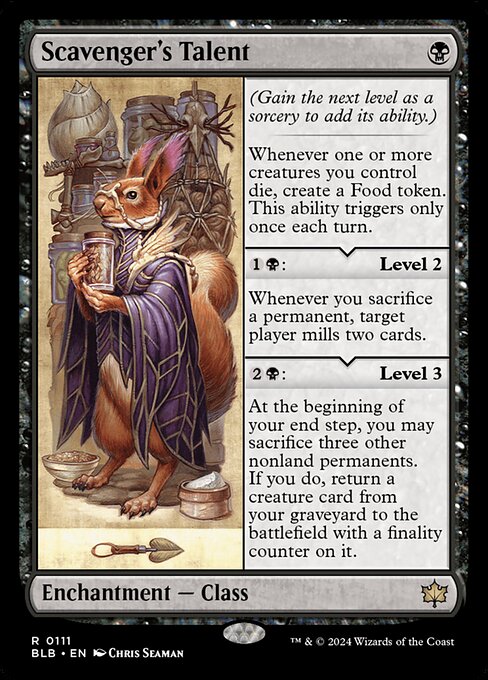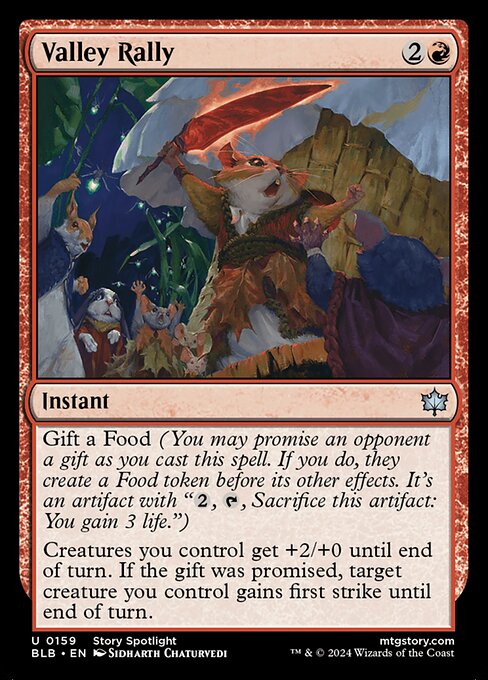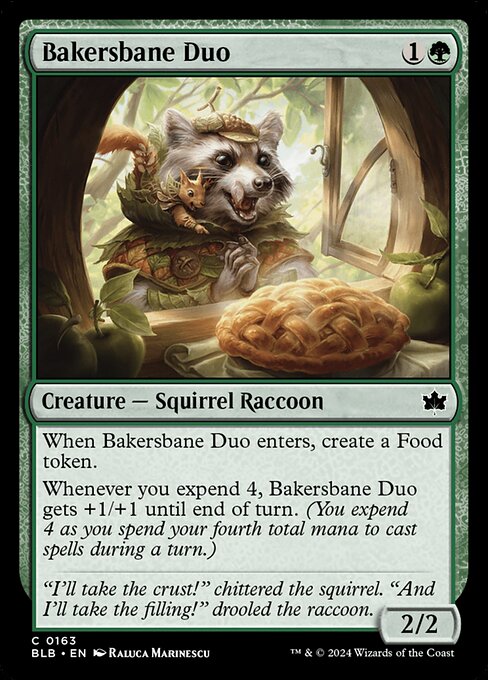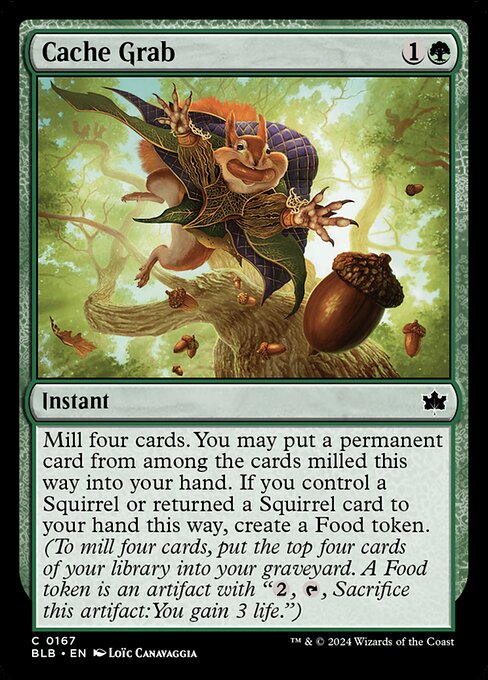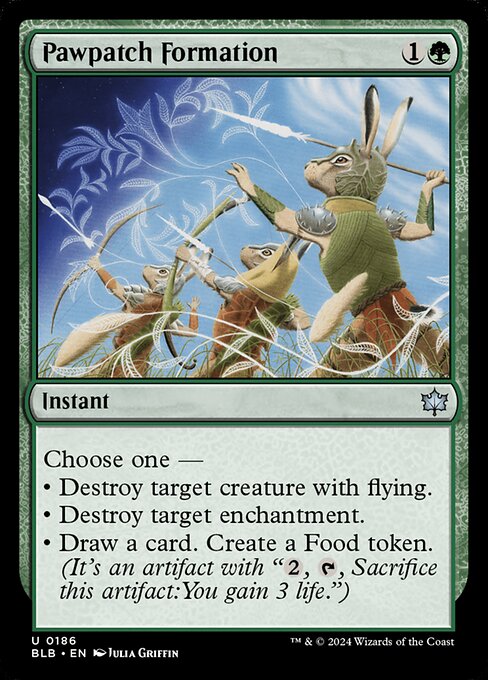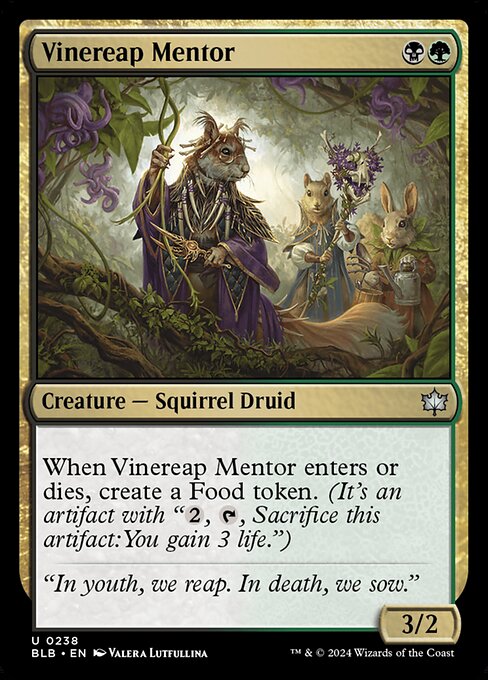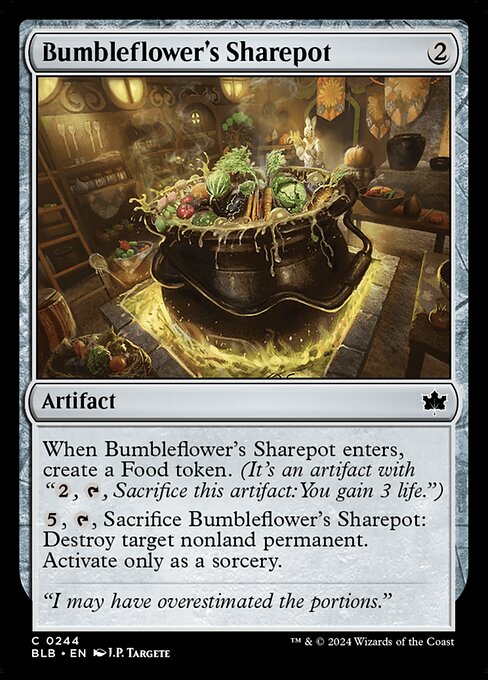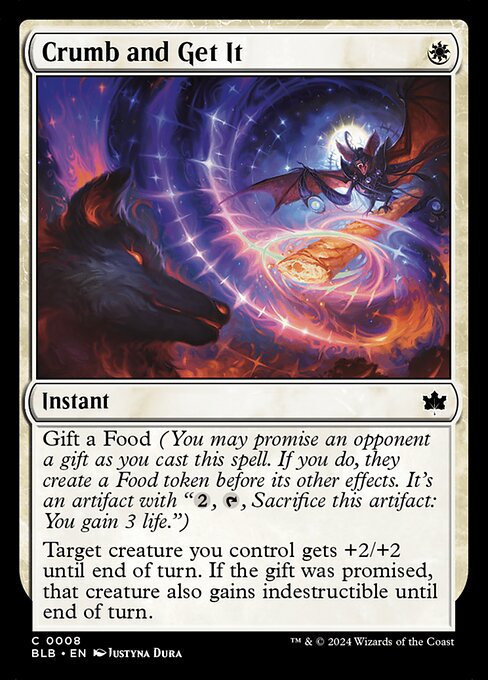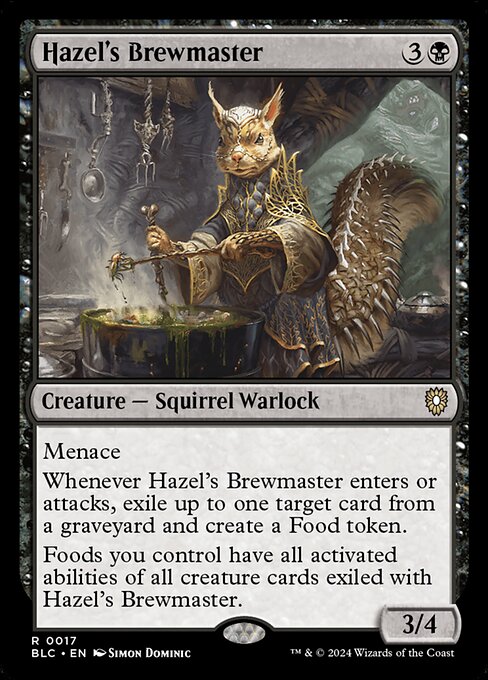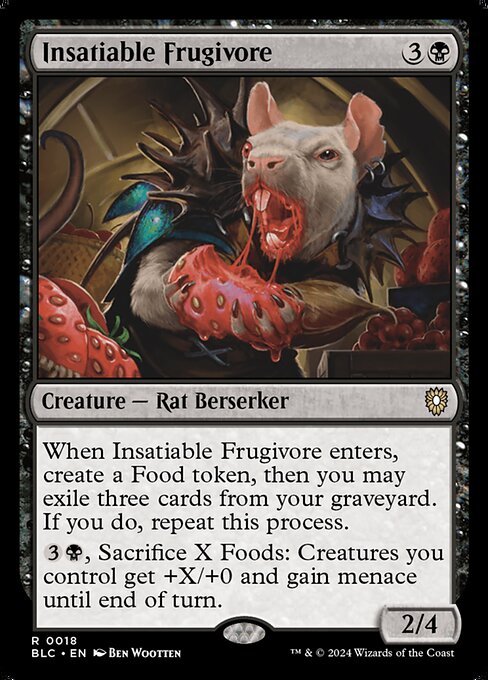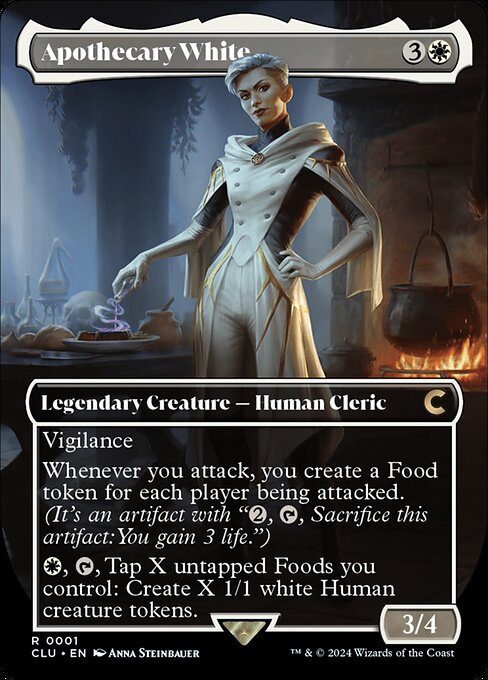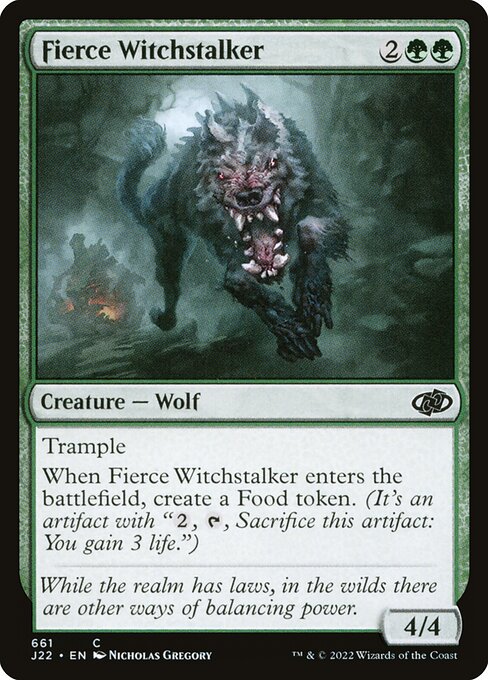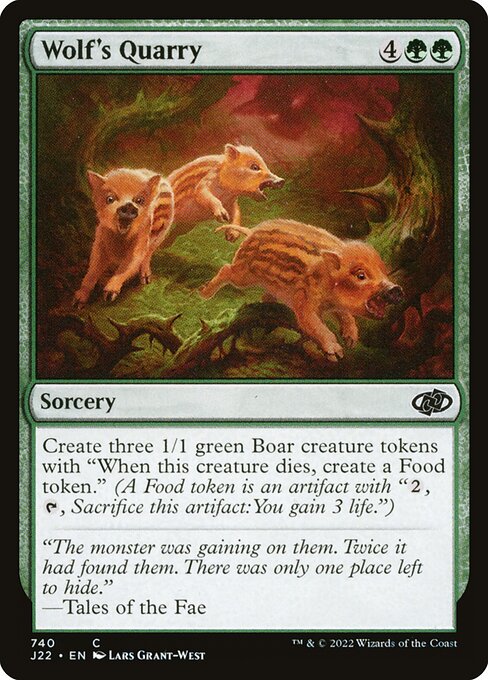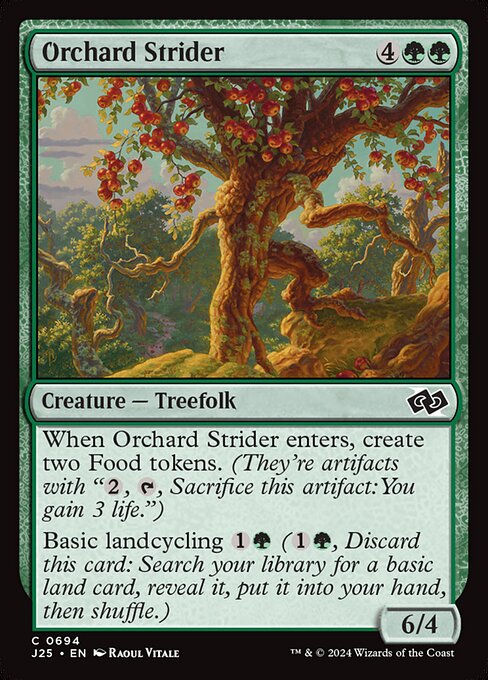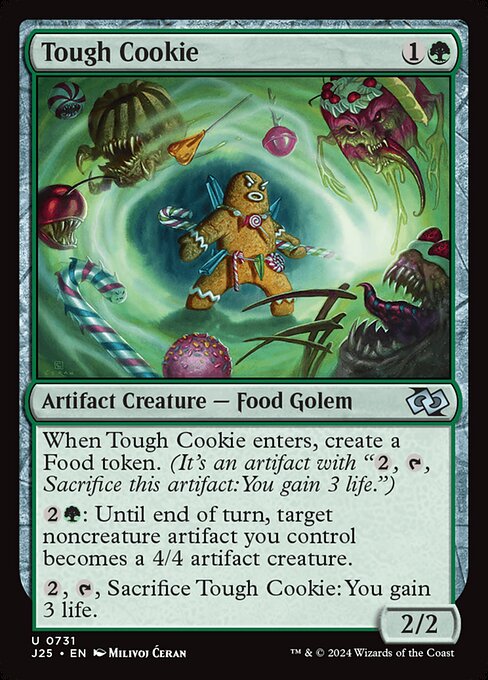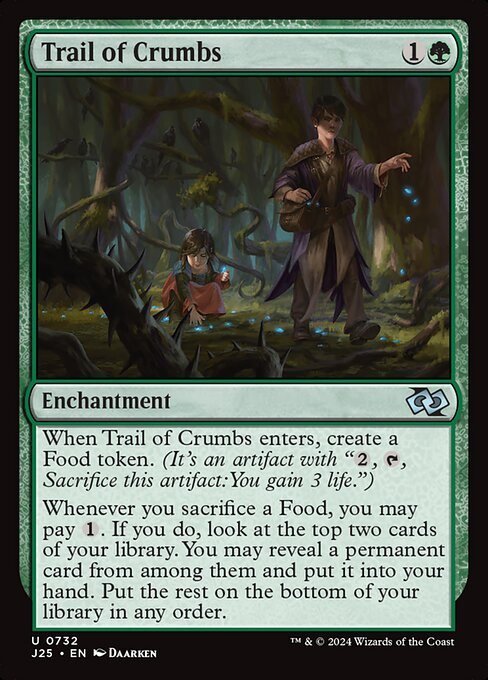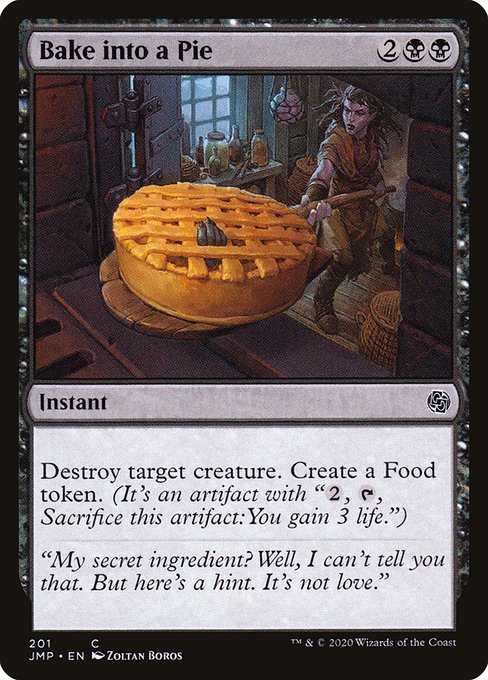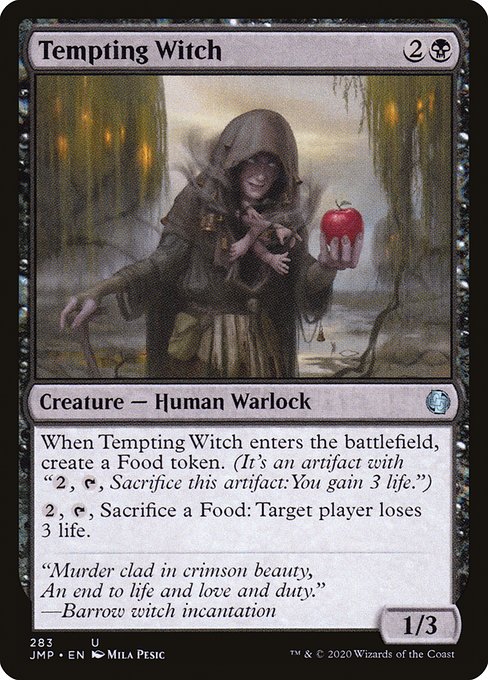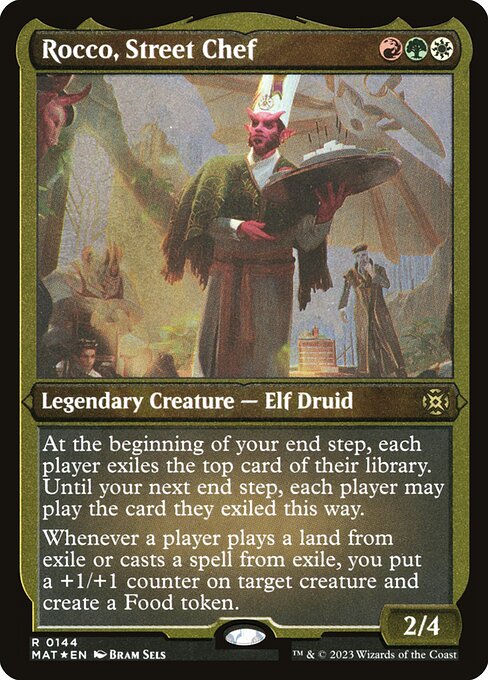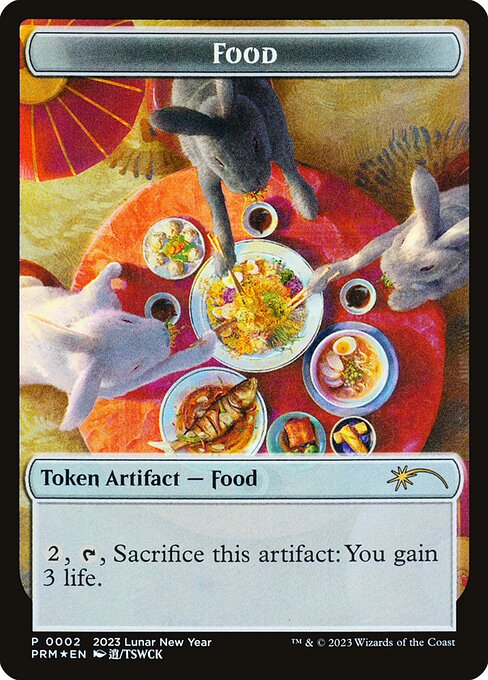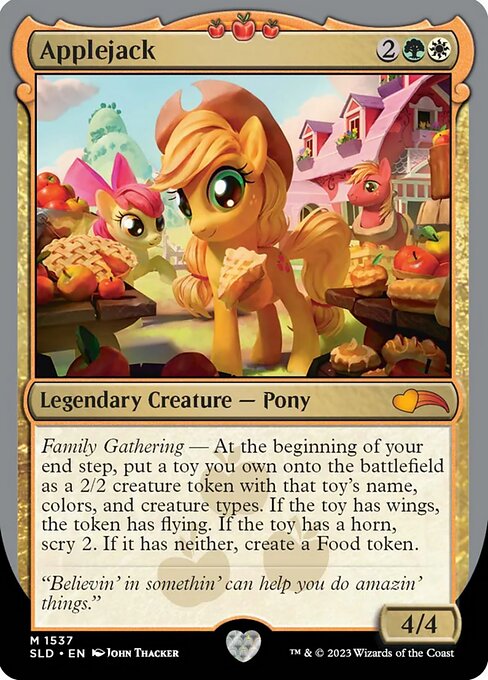Faim nocturne
Éphémère
Faites cadeau d'une nourriture (Vous pouvez promettre un cadeau à un adversaire au moment où vous lancez ce sort. Si vous faites ainsi, il crée un jeton Nourriture avant ses autres effets. C'est un artefact avec « , , sacrifiez cet artefact : Vous gagnez 3 points de vie. »)
Détruisez une créature ciblée. Si le cadeau n'a pas été promis, vous perdez 2 points de vie.
Détruisez une créature ciblée. Si le cadeau n'a pas été promis, vous perdez 2 points de vie.
standard
future
historic
gladiator
pioneer
explorer
modern
legacy
pauper
vintage
penny
commander
brawl
alchemy
paupercommander
duel
oldschool
premodern
Rulings
If an effect refers to a Food, it means any Food artifact, not just a Food artifact token. For example, when you forage, you can sacrifice Carrot Cake.
In the main set, there are four different kinds of gifts. “Gift a Food” causes the chosen opponent to create a Food token, while “Gift a Treasure” causes the chosen opponent to create a Treasure token. “Gift a card” causes them to draw a card, and “Gift a tapped Fish” causes them to create a tapped 1/1 blue Fish creature token. The Commander decks contain two more kinds of gifts: “Gift an Octopus,” which causes the chosen opponent to create an 8/8 blue Octopus creature token, and “Gift an extra turn,” which causes them to take an extra turn after the current turn ends.
If a spell for which the gift was promised is countered, doesn’t resolve (perhaps because all of its targets are illegal), or is otherwise removed from the stack, the gift won’t be given. None of its other effects will happen either.
You can’t pay a gift cost more than once.
As an additional cost to cast a spell with gift, you can promise the listed gift to an opponent. That opponent is chosen as part of that additional cost. The gift isn’t given at this time; rather, it’s given at a later time based on whether or not the spell is a permanent spell.
Whatever you do, don’t eat the delicious cards. The raccoonfolk know better, and so should you!
For instants and sorceries with gift, the gift is given to the appropriate opponent as part of the resolution of the spell. This happens before any of the spell’s other effects would take place.
Some spells and abilities that create Food tokens may require targets. If each target chosen is an illegal target as that spell or ability tries to resolve, it won’t resolve. You won’t create any Food tokens.
Some instant or sorcery spells require alternative or additional targets if the gift was promised. You ignore these targeting requirements if the gifts aren’t promised for those spells. On the other hand, you can promise a gift for a permanent spell even if you won’t be able to choose targets for an enters ability of that permanent once the spell resolves.
Food is an artifact type. Even though it appears on creatures in some releases, it’s never a creature type.
If you copy a spell for which the gift was promised, the gift was also promised to the same opponent for the copy. If a card or token enters as a copy of a permanent that’s already on the battlefield, the gift isn’t promised for that new permanent, even if it was promised for the original.
You can’t sacrifice a Food to pay multiple costs. For example, you can’t sacrifice a Food token to activate its own ability and also to forage.
For permanent spells with gift, an ability triggers when that permanent enters if the gift was promised. When that ability resolves, the gift is given to the appropriate opponent.
In the main set, there are four different kinds of gifts. “Gift a Food” causes the chosen opponent to create a Food token, while “Gift a Treasure” causes the chosen opponent to create a Treasure token. “Gift a card” causes them to draw a card, and “Gift a tapped Fish” causes them to create a tapped 1/1 blue Fish creature token. The Commander decks contain two more kinds of gifts: “Gift an Octopus,” which causes the chosen opponent to create an 8/8 blue Octopus creature token, and “Gift an extra turn,” which causes them to take an extra turn after the current turn ends.
If a spell for which the gift was promised is countered, doesn’t resolve (perhaps because all of its targets are illegal), or is otherwise removed from the stack, the gift won’t be given. None of its other effects will happen either.
You can’t pay a gift cost more than once.
As an additional cost to cast a spell with gift, you can promise the listed gift to an opponent. That opponent is chosen as part of that additional cost. The gift isn’t given at this time; rather, it’s given at a later time based on whether or not the spell is a permanent spell.
Whatever you do, don’t eat the delicious cards. The raccoonfolk know better, and so should you!
For instants and sorceries with gift, the gift is given to the appropriate opponent as part of the resolution of the spell. This happens before any of the spell’s other effects would take place.
Some spells and abilities that create Food tokens may require targets. If each target chosen is an illegal target as that spell or ability tries to resolve, it won’t resolve. You won’t create any Food tokens.
Some instant or sorcery spells require alternative or additional targets if the gift was promised. You ignore these targeting requirements if the gifts aren’t promised for those spells. On the other hand, you can promise a gift for a permanent spell even if you won’t be able to choose targets for an enters ability of that permanent once the spell resolves.
Food is an artifact type. Even though it appears on creatures in some releases, it’s never a creature type.
If you copy a spell for which the gift was promised, the gift was also promised to the same opponent for the copy. If a card or token enters as a copy of a permanent that’s already on the battlefield, the gift isn’t promised for that new permanent, even if it was promised for the original.
You can’t sacrifice a Food to pay multiple costs. For example, you can’t sacrifice a Food token to activate its own ability and also to forage.
For permanent spells with gift, an ability triggers when that permanent enters if the gift was promised. When that ability resolves, the gift is given to the appropriate opponent.
Rulings
If an effect refers to a Food, it means any Food artifact, not just a Food artifact token. For example, when you forage, you can sacrifice Carrot Cake.
In the main set, there are four different kinds of gifts. “Gift a Food” causes the chosen opponent to create a Food token, while “Gift a Treasure” causes the chosen opponent to create a Treasure token. “Gift a card” causes them to draw a card, and “Gift a tapped Fish” causes them to create a tapped 1/1 blue Fish creature token. The Commander decks contain two more kinds of gifts: “Gift an Octopus,” which causes the chosen opponent to create an 8/8 blue Octopus creature token, and “Gift an extra turn,” which causes them to take an extra turn after the current turn ends.
If a spell for which the gift was promised is countered, doesn’t resolve (perhaps because all of its targets are illegal), or is otherwise removed from the stack, the gift won’t be given. None of its other effects will happen either.
You can’t pay a gift cost more than once.
As an additional cost to cast a spell with gift, you can promise the listed gift to an opponent. That opponent is chosen as part of that additional cost. The gift isn’t given at this time; rather, it’s given at a later time based on whether or not the spell is a permanent spell.
Whatever you do, don’t eat the delicious cards. The raccoonfolk know better, and so should you!
For instants and sorceries with gift, the gift is given to the appropriate opponent as part of the resolution of the spell. This happens before any of the spell’s other effects would take place.
Some spells and abilities that create Food tokens may require targets. If each target chosen is an illegal target as that spell or ability tries to resolve, it won’t resolve. You won’t create any Food tokens.
Some instant or sorcery spells require alternative or additional targets if the gift was promised. You ignore these targeting requirements if the gifts aren’t promised for those spells. On the other hand, you can promise a gift for a permanent spell even if you won’t be able to choose targets for an enters ability of that permanent once the spell resolves.
Food is an artifact type. Even though it appears on creatures in some releases, it’s never a creature type.
If you copy a spell for which the gift was promised, the gift was also promised to the same opponent for the copy. If a card or token enters as a copy of a permanent that’s already on the battlefield, the gift isn’t promised for that new permanent, even if it was promised for the original.
You can’t sacrifice a Food to pay multiple costs. For example, you can’t sacrifice a Food token to activate its own ability and also to forage.
For permanent spells with gift, an ability triggers when that permanent enters if the gift was promised. When that ability resolves, the gift is given to the appropriate opponent.
In the main set, there are four different kinds of gifts. “Gift a Food” causes the chosen opponent to create a Food token, while “Gift a Treasure” causes the chosen opponent to create a Treasure token. “Gift a card” causes them to draw a card, and “Gift a tapped Fish” causes them to create a tapped 1/1 blue Fish creature token. The Commander decks contain two more kinds of gifts: “Gift an Octopus,” which causes the chosen opponent to create an 8/8 blue Octopus creature token, and “Gift an extra turn,” which causes them to take an extra turn after the current turn ends.
If a spell for which the gift was promised is countered, doesn’t resolve (perhaps because all of its targets are illegal), or is otherwise removed from the stack, the gift won’t be given. None of its other effects will happen either.
You can’t pay a gift cost more than once.
As an additional cost to cast a spell with gift, you can promise the listed gift to an opponent. That opponent is chosen as part of that additional cost. The gift isn’t given at this time; rather, it’s given at a later time based on whether or not the spell is a permanent spell.
Whatever you do, don’t eat the delicious cards. The raccoonfolk know better, and so should you!
For instants and sorceries with gift, the gift is given to the appropriate opponent as part of the resolution of the spell. This happens before any of the spell’s other effects would take place.
Some spells and abilities that create Food tokens may require targets. If each target chosen is an illegal target as that spell or ability tries to resolve, it won’t resolve. You won’t create any Food tokens.
Some instant or sorcery spells require alternative or additional targets if the gift was promised. You ignore these targeting requirements if the gifts aren’t promised for those spells. On the other hand, you can promise a gift for a permanent spell even if you won’t be able to choose targets for an enters ability of that permanent once the spell resolves.
Food is an artifact type. Even though it appears on creatures in some releases, it’s never a creature type.
If you copy a spell for which the gift was promised, the gift was also promised to the same opponent for the copy. If a card or token enters as a copy of a permanent that’s already on the battlefield, the gift isn’t promised for that new permanent, even if it was promised for the original.
You can’t sacrifice a Food to pay multiple costs. For example, you can’t sacrifice a Food token to activate its own ability and also to forage.
For permanent spells with gift, an ability triggers when that permanent enters if the gift was promised. When that ability resolves, the gift is given to the appropriate opponent.
Votre collection ? vos decks ?
Envie de gérer votre collection et/ou créer des decks ?
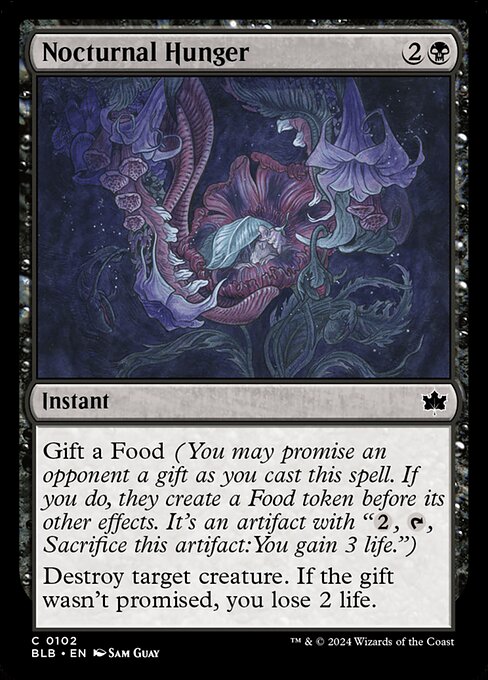

 0
0
 0.04€
0.04€

